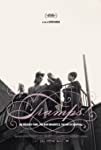Eye For Film >> Movies >> Tramps! (2022) Film Review
Tramps!
Reviewed by: Jennie Kermode

It has been marketed as a documentary about the New Romantics, though most of those involved did not associate themselves with that term, and it significantly predates the synth pop associated with that movement. You won’t find big stars here, or even well known tunes – Matthew Sims and Verity Susman have provided it with an entirely new electronic score – as director Kevin Hegge instead focuses on the artists whose work underlay the movement, exploring the substance behind the style.
As a result of this approach, what could have been just another exercise in nostalgia instead emerges as a valuable picture of a grassroots creative movement which emerged as a counterpoint to the nihilism of punk (though with some overlap) and enabled talented individuals to flourish like flowers in asphalt. It wasn’t unique, of course – such individuals occur from time to time all over the world – but it stood out because of the sheer number of them who happened to come together in the Blitz club in Covent Garden. There Steve Strange – later of Visage – was on the door, and maintained a very strict dress code which mandated imagination. The scene which emerged would extend across other social spaces and extensive private parties, but it was at the club where it began to catch the eye of the press and make a wider impression.

Like the New York ballroom scene in years to come, this movement was explicitly queer from the outset, though straight people were welcome if they had sufficient talent. The film has toured 2022’s queer festivals, including BFI Flare in London and Toronto’s Inside Out. It finds a natural audience in those familiar with the work of Derek Jarman, who was a significant influence on the new romantics and often inhabited the same spaces, acting as a kind of elder statesman. Once the scene was noticed by the media, particular attention came to be paid to its annual Alternative Miss World contests, overtly queer events where costumerie was more magnificent than ever. Ultimately, one of the reasons why it faded was the loss of many key figures to the AIDS epidemic. Hegge finds room in his film for these highs and lows to exist side by side.
In referencing costume, it’s important to note that this wasn’t a scene buoyed up by money. The poverty faced by those at the bottom of the heap in London was not like today’s. State benefits provided enough to keep people warm and fed, and many of them lived in squats so didn’t need to pay rent. Their clothing budgets, however, necessitated buying things second hand and altering them, developing strong crafting skills, scavenging and creating garments, jewellery and art out of whatever they could find. Whilst some of the successful musicians of the time lauded Thatcherism and the free market, these were the people experiencing the flip side, lacking opportunity and therefore making their own – though perhaps not in the way that the government intended.
Quite a number of them are still working in artistic and creative professions today, whilst others continue to dress distinctively and look – for lack of a better word - fabulous. There was criticism at the time of how closely some of their fashions aped the cultural elite of a century previously, as it became difficult to distinguish between satire and endorsement, but the clear message they sent was that it was possible to thrive on one’s own terms, without playing by society’s rules: a message which would prove vital to future movements, though here we see that only in passing. Hegge has assembled an impressive number of interviewees who had important roles to play at the time, from Scarlet Cannon to Princess Julia, and particularly touching (as well as astute and informative) are the interviews with Judy Blame, who died in 2018 whilst the film was still in production.
As one would expect, disagreement is rife amongst the contributors, but Hegge draws clear threads out of the chaos and constructs something which feels more, not less resonant for the diversity of opinion it contains. Notably still present is the passion which drove the movement forward, and that competitive spirit which encouraged Blitz regulars to engage in constant efforts to outdo one another. In what will be a valuable contribution to the archive, Hegge captures not the frivolous pop scene which some will expect, but an inspired and vital movement which defied the political and cultural climate of the time, and whose influence is still felt today.
Tramps! will be available to watch on digital in the UK from 11 December.
Reviewed on: 03 Jun 2022


















